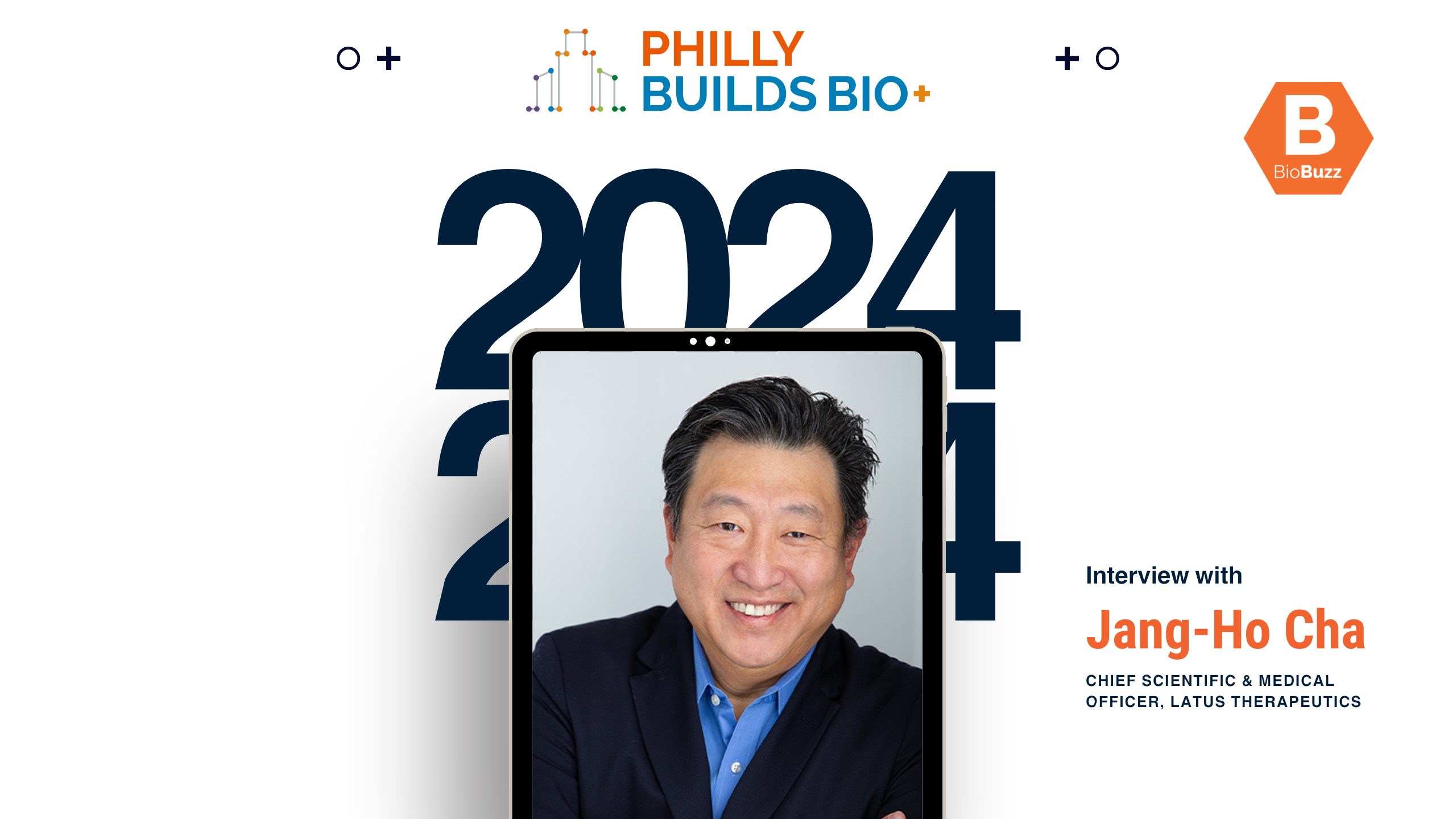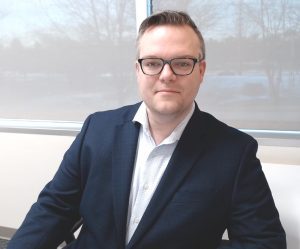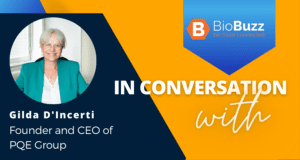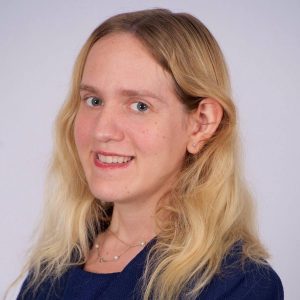
In Conversation with Jang-Ho Cha, Chief Scientific & Medical Officer, Latus Therapeutics
At the Philly Builds Bio 3rd Annual Symposium, BioBuzz’s CEO Chris Frew interviewed Jang-Ho Cha, Chief Scientific and Medical Officer of Latus Therapeutics. Latus, launched in May, focuses on developing novel gene therapy technologies and lead product candidates for CLN2 disease and Huntington’s disease, aiming to create AAV capsid variants with improved potency, specificity, and safety to address these CNS diseases.
| This article is part of our In Conversation series, one of our ongoing People & Places Features. Go indepth with some of the most interesting people making impact across BioBuzz’s growing biohubs. |
Chris Frew [00:00:05]:
Welcome. I’m Chris Frew, CEO of BioBuzz Networks. I’m thrilled to be here today at the Philly builds bio 3rd Annual Life Science Symposium. We’re here in the city with hundreds of attendees and dozens of panelists who came today to talk about innovation in life sciences and everything that’s happening here in greater Philadelphia. And I’m honored to be here today with Jang-Ho. Thank you for joining me. Would you mind giving yourself a quick introduction?
Jang-Ho Cha [00:00:31]:
Yeah, happy to. My name is Jang-Ho Cha. I’m an MD, PhD, neurologist, neuroscientist, and I had a long career in academic neurology at Massachusetts General Hospital in Boston, taking care of patients, teaching medical students, and running a research lab really looking at the molecular mechanisms of neurodegenerative diseases such as Alzheimer’s, Parkinson’s and Huntington’s disease. After Mass General, I went to work at Merck, based outside of Philadelphia in North Wales, pa, for a number of years and then moved back to the Boston area where I was for eight years the global head of translational medicine for neuroscience at Novartis, where my group oversaw the development of the clinical early phase clinical trials for diseases in neurology, psychiatry, pain and CNS gene therapy. And in 2022, I joined Lattice Bio as the chief scientific officer and chief medical officer. So it’s great to be here with you.
Chris Frew [00:01:42]:
Thank you. Would you mind taking a couple minutes just to tell us a little about Latus Bio and the work you all are doing?
Jang-Ho Cha [00:01:49]:
Yeah. So Latus Bio is founded on the science that comes out of the laboratory of Dr. Beverly Davidson. Beverly, Bev, is known as the co-founder of Spark Therapeutics, one of the OGs of the gene therapy world, but has also been on the scientific advisory board of very many gene therapy companies. I’ve known Bev Davidson through the Huntington’s world largely for about 20 years. And two years ago, she reached out to me and said, look, we’re really excited about the stuff coming out of our lab. We spun out a company and you should come be the CSO. And I said, yeah, no, I’m not interested. I have this great job that I really like. And by the way, we’re doing CNS gene therapy, so I’m not interested. But you’re my pal, of course, I’ll hear you out. And she showed me her stuff. And one of the challenges in CNS gene therapy has been that the viruses that are used to deliver the genetic material really are pretty poor at transducing the brain cells that you need to in order to be effective. And what Bev’s lab had done, and this is the foundation of the company, is to create, to engineer a whole bunch of novels. AAV, adeno-associated virus capsids, that had tremendous properties of being able to get into brain cells. And so as soon as I saw these pictures that she was showing me, it was like, oh, wow, this is game changing. And oh no, I have to quit this job that I really like and I have to go do this thing. And so I joined as the CSO and CMO of Latus in December of 2022 because this was just too exciting an opportunity to not be part of.
Chris Frew [00:03:46]:
Some of the best journeys often start with a no, I guess.
Jang-Ho Cha [00:03:48]:
Yeah, well, it was easy to say no until you saw the actual data. And then once you realized that this could be groundbreaking, I kind of liken it to somebody opening a box and you see a dragon’s egg and you recognize that that’s a dragon’s egg. It’s like, holy moly. Who’s going to get to take care of this? Right? So that kind of like if I don’t do this, who’s going to get to do it? So there’s a little bit of FOMO there, but also a sense that, okay, I think I could do this and I think I could bring this idea or nascent data to fruition, which is a therapy for patients.
Chris Frew [00:04:29]:
That’s great. You mentioned also the opportunity again, her story and her impact that she’s already had on the field. Maybe you could talk about. I mean we’re here at Philly builds bio today. So we are talking about the city, people like her and other innovations that are coming out. How unique is kind of the place that we are at here for gene therapy and with the talent and expertise and the research that are in this region?
Jang-Ho Cha [00:04:55]:
Yeah, Philly is been a real pioneer in gene and cell therapies. Really a lot of it coming out of CHOP and UPENN and multiple groups and multiple companies. Bev herself has had a hand in the co founding of Spark, which is a very famous company. So I think the spirit of innovation and doing things that a number of years ago were science fiction or science fiction are being reduced to practice. It’s still a hard job to make something into a drug, to do the clinical trials, to make sure that you don’t have toxicity, to make sure that you do have efficacy. All that’s hard, unglamorous work. But the scientific foundations of that. Philly is really the heart of all of this.
Chris Frew [00:05:41]:
Yeah, you mentioned something earlier too about the opportunity to bring novel medicines to patients who really need it. How important in your work and the work that’s being done is that is keeping the patient front and center?
Jang-Ho Cha [00:05:56]:
Oh, absolutely. It’s, I would say for us at Latus, but for many other companies the patient is the North Star. It has to be. You know, science and biotechs are filled with nerds such as myself, but nerds also want their work to matter. And I think the way your work can matter is if you can really use your big science brain to come up with a treatment that’s going to make a meaningful difference in someone’s life just because you’ve applied science to it. So I think in terms of it’s really not about the dollars, it’s about kind of giving meaning to your scientific career. And I think imbuing that into the service of really improving human health is a tremendous motivator.
Chris Frew [00:06:50]:
Yeah. Speaking of motivation, it’s been a challenging few years for a lot of companies just raising money and being able to get products into the clinic and move. Latus bio had a successful raise earlier this year. One of several Philadelphia companies. You know, can you talk to us a little bit about, you know, how you, you and the team over, you know, kind of got, got to that raise and really what was your goal with that raise and what’s kind of the next milestone?
Jang-Ho Cha [00:07:17]:
Yeah, so we have just talked to everyone we can, we’ve talked to lots of different groups, pitching our ideas, showing our data, why we have reason to believe that this is going to work, that we have advantages over other competitors, et cetera. It’s been a slog, I would say. I think in prior years with the same data package, we might have been even more successful. I’m optimistic that the environment will turn, the faucets will turn back on a little bit. But in that time I think there have been some benefits. We’ve been very efficient in terms of what we choose to do. We understand the importance of data and how to present it. We understand that creating more data, working in the lab and advancing towards milestones helps our credibility as a group that can get stuff done. So I think, I wish that we had more money on hand. I wish that the money were easier to get. And I think that’s going to happen, not the least of which is the interest rate cuts. I think there’s also a lot of pent up demand for investment dollars or pent up dollars to be spent. And I also look at the big pharmas which many of them over the past couple of years have cut their pipelines, which is short term helpful for their expenditures, but they’re going to need products to register. And I don’t know where that pipeline is going to come from. I think they’re. What we should be seeing in the near future is kind of an increased demand from the larger pharmas for advanced programs that have made it into the clinic, that have shown some signs of efficacy, that have a favorable adverse event profile.
Chris Frew [00:09:10]:
Yeah, I think a lot of people. Let’s find it and hope. I hope you’re right. What, as we wrap up here, what is the next milestones in kind of your path to the clinic?
Jang-Ho Cha [00:09:22]:
Yeah. So we have two lead programs. The one is slightly ahead of the other. We’re having health authority interactions as we speak. We had one last month. We have another one coming up this month. So we are actually headed directly towards the clinic, which is kind of a heady moment for a small biotech. But we’re advancing towards the clinic and I think that’s really important, again, for a couple of reasons. Number one, the patient is our North Star. We’re not just doing experiments to impress each other. We want to get this to patients. And number two, I think it’s a nice demonstration of our credibility that we can execute on, number one, great science to start with. But the science alone is not sufficient. You have to advance it through all of the unglamorous steps in order to be able to have the privilege of. Of doing a clinical trial with actual patients.
Chris Frew [00:10:17]:
Well, Jang-Ho, thank you so much for joining me today. I really enjoyed the discussion. I think some of the messages I’m taking away is obviously, keep the patient as a North Star and focus on the hard things. Be in the lab, get the data, hit your milestones, and, you know, there’s hope for the future. For what? What a lot of people are working towards.
Jang-Ho Cha [00:10:37]:
Yeah, I think that’s right. I think, you know, we want to work in the lab and have the urgency that our patients and families want us to be working with. So just think if this is one of your family members, how hard would you work? And that’s what we just try to kind of bring every day.
Chris Frew [00:10:54]:
Terrific.
Jang-Ho Cha [00:10:54]:
Yeah.
Chris Frew [00:10:55]:
Well, thank you again for joining me today.
Jang-Ho Cha [00:10:56]:
Thank you. Pleasure.
Chris Frew [00:10:57]:
My name is Chris Frew. I’m the CEO of BioBuzz Networks. We’re recording this live today from Philly Builds Bio. Thank you for joining us.
- About the Author
- Latest Posts
BioBuzz is a community led, experience focused, biotech and life sciences media and events company. BioBuzz highlights regional breaking news, industry professionals, jobs, events, and resources for business and career growth. Their weekly newsletter is subscribed to by thousands in the BioHealth Capital Region and Greater Philadelphia as the go-to for industry updates.






